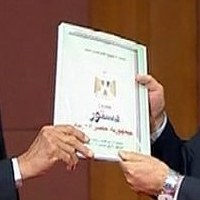![]()
RubinReports | By Barry Rubin
Muhammad Mursi (Muslim Brotherhood), 25.3 percent
Ahmad Shafiq (ex-general, ex-prime minister), 24.9 percent
Hamdin Sabbahi (radical left), 21.5 percent
Abdul Moneim Aboul Fotouh (“moderate Islamist”), 19 percent
Amr Moussa (radical nationalist), less than 10 percent
While the Brotherhood claims victory, the election was actually a defeat — at least temporary and possibly less important than it seems — for the Brotherhood and Islamism. Here’s why.
The Islamist Camp
Note that only about 44 percent of voters backed an Islamist candidate, compared to 75 percent in the parliamentary election, while only about 25 percent voted for the Muslim Brotherhood compared to about 47 percent in the parliamentary vote. Why?
To begin with, the two top Islamist candidates were removed by the election commission, the Brotherhood’s first choice and the only Salafist candidate. Presumably, many voters stayed home or opted for their second choice party. The question is whether those who crossed the line and voted for a non-Islamist will return to the Brotherhood in the second round.
A key question is the 25 percent who backed a Salafist in the parliamentary election but could not do so in this one. Did they stay home, or vote for the Brotherhood or the “moderate Islamist,” or for a secular party? And again, will most of them back the Brotherhood or a Mubarak era politician?
Clearly, the mistakes made by the Islamists were costly, and they do make many errors. The Salafists nominated a candidate who was vulnerable to vetting. He didn’t meet the qualifications of purely Egyptian citizenship for himself and his family.
On the Brotherhood’s part, victory in the previous elections made them more radical and more arrogant. They mistakenly cast off the cloak of pretended moderation too soon and too completely. So much for the “Turkish model!” This hubris scared some voters. Shafiq’s campaign managers warned voters that to elect Mursi would set off a battle for an “Islamic empire.”
But note this theme of radicalism going along with victory because it is going to be one of the most important of all. Let’s summarize it:
When Islamists win, they become bolder and more aggressive. Western observers who talk about moderating Islamism think the opposite.
An opposing camp, however, those who argue all Muslims “must” be Islamists and that political Islam inevitably sweeps all before it have also been proven wrong. As I try to explain, this is a political struggle that can go either way depending on circumstances.
Islamism is by no means immune to social conditions. The strongest support for Mursi is in Egypt’s poor, underdeveloped south; the weakest backing is in the cities.
Yet let’s also remember that the Islamists are still heading for control over Egypt. The parliament, which they run, is going to make the rules and write the constitution. If they don’t like who becomes president, they will reduce his powers.
Some argue that voters left the Islamists because they had thought they would be “different” and “honest” but have concluded that they are just regular politicians. It’s hard for me to understand how this can be true, however, because they haven’t actually done anything yet! Not a single law has been passed; no constitution has been written.
A more likely explanation, I think, is that either the Brotherhood scared them by being so extreme or they want to balance its power by having some institutions in the control of others.
A final note, the phenomenon of “moderate Islamism” is not a significant player here. It was a “one-man” operation (and I don’t believe Aboul Fotouh was more than marginally more moderate) and has no political party or representation in parliament. While the 18 percent of the vote it received seems significant, many of those voters were possibly more radical than the Brotherhood itself because of the Salafist endorsement.
The Non-Islamist Camp(s)
Note well that the three non-Islamist candidates had a majority. This means that if voters stay within these two camps, Shafiq will be elected president.
The main irony is that their leading candidate shows support for the kind of rule being delivered by the army junta now and even by the (supposedly) despised Mubarak regime. A lot of Egyptians want quiet and order. And Shafiq outpaced the alternative “establishment” candidate Amr Moussa because he is even more bland and moderate.
Again, though, note that Shafiq could be a president with few powers facing a parliament that is handcrafting a constitution intended to bring Islamism. Moreover he has no political organization.
Or does he? Perhaps he has one that can be called the Egyptian army. A key point: If the Brotherhood doesn’t make the army very happy (financially), there might be some serious confrontations. In the longer run, there could even be a coup and that would return Egypt back to where it was politically before the whole “Arab Spring” business began!
The biggest shock of the election was the massive vote for the communist-Nasserist Sabbahi of the al-Karamah party. Does this show that there is a floating “radical vote” that cares less about ideology than about massive change? His voters mainly came from big cities.
Sabbahi is as dangerous as any Salafist — as anti-American and as eager to go to war against Israel — though he lacks a strong organization. Is this support for him, though, merely a more militant expression of nostalgia for the old regime likely to benefit the anti-Brotherhood side or a yearning for upheaval that might make people almost equally willing to vote for a Nasserist or an Islamist? We will find out.
Is Islamism continuing to march forward? Yes. Remember this principle: The Key to “Coopting” Islamists is for them to lose and accept defeat. But what if they win victory, especially an overwhelming victory in practice, they become more aggressive.
The Brotherhood’s recent history (and also that of Hamas, Hizballah, and the Turkish regime) proves this point and that’s why Western policies of encouraging the Islamists as a way to moderate them are wrong.
At this point, the issue depends on how smart the Islamist leaders are going to be. In retrospect, they made a mistake in running a candidate for president. If they had thrown their backing behind a non-Islamist figurehead and then made him a ceremonial president, the Brotherhood would be more respected and better off today. Ultimately, it cannot control its naked lust for power. The presidential election will make it more eager to transform Egypt’s laws.
In addition, keep in mind the importance of violence. The Salafists are hopping mad, believing they’ve been cheated. It is likely they will attack secularists, women who evince “non-Muslim” behavior, and Christians. In some areas, they will raid police stations. The question is whether such violence will build a revolutionary base or drive frightened Egyptians into the arms of Shafiq and the army.
Finally, the liberals are cut out entirely, partly due to the conditions of Egypt, partly to their own ineptness. Ahmed Khairy, spokesman for the Free Egyptians Party, a secular grouping that’s closest to what Western democracy enthusiasts would like to see in Egypt, described the election as “the worst possible scenario.” He called Mursi an “Islamic fascist” and Shafiq a “military fascist.”
If that’s how a moderate sees the choices, though it’s not fair to Shafiq, it shows how bad things are in Egypt.



 RSS
RSS











Latest Comments
Hello Mike, Thank you for your positive feedback to the article. I felt there wasn’t too much critical analysis of ...
Thanks for this considered and well constructed article. A follow up article on the manner in which the editorial contro...
THE CLUELESSNESS OF CLAIMING THAT OBAMA'S MIDDLE EAST POLICIES WERE A FAILURE CANNOT BE FURTHER FROM THE TRUTH, WHAT THE...
As long as Obama is the president of the usa do not trust the us government......
Thank you for an good read....